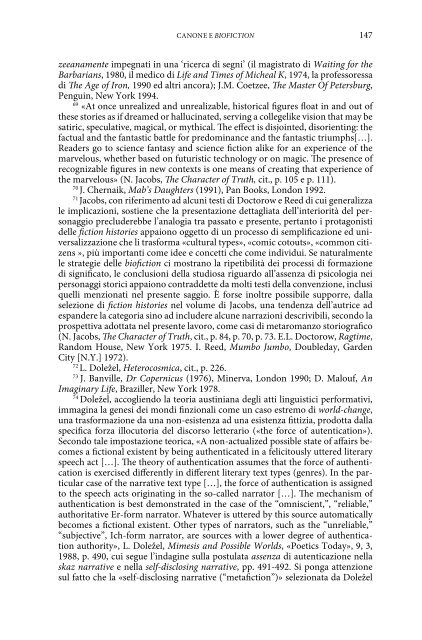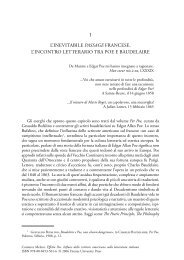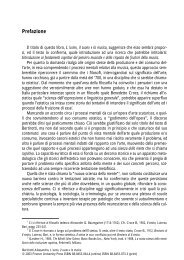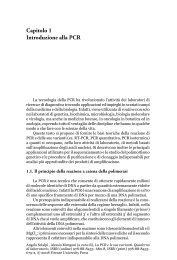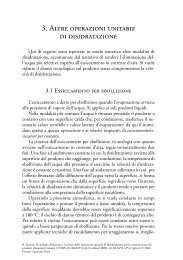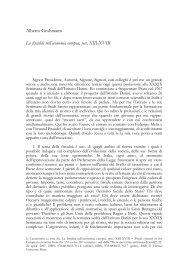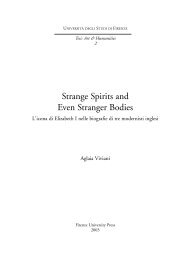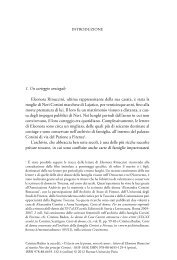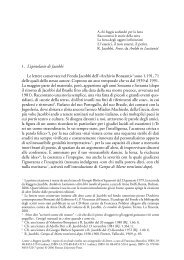biblioteca di studi di filologia moderna – 10 - Firenze University Press
biblioteca di studi di filologia moderna – 10 - Firenze University Press
biblioteca di studi di filologia moderna – 10 - Firenze University Press
Create successful ePaper yourself
Turn your PDF publications into a flip-book with our unique Google optimized e-Paper software.
canone e BIOFICTION 147<br />
zeeanamente impegnati in una ‘ricerca <strong>di</strong> segni’ (il magistrato <strong>di</strong> Waiting for the<br />
Barbarians, 1980, il me<strong>di</strong>co <strong>di</strong> Life and Times of Micheal K, 1974, la professoressa<br />
<strong>di</strong> The Age of Iron, 1990 ed altri ancora); J.m. coetzee, The Master Of Petersburg,<br />
Penguin, new York 1994.<br />
69 «at once unrealized and unrealizable, historical figures float in and out of<br />
these stories as if dreamed or hallucinated, serving a collegelike vision that may be<br />
satiric, speculative, magical, or mythical. The effect is <strong>di</strong>sjointed, <strong>di</strong>sorienting: the<br />
factual and the fantastic battle for predominance and the fantastic triumphs[…].<br />
readers go to science fantasy and science fiction alike for an experience of the<br />
marvelous, whether based on futuristic technology or on magic. The presence of<br />
recognizable figures in new contexts is one means of creating that experience of<br />
the marvelous» (n. Jacobs, The Character of Truth, cit., p. <strong>10</strong>5 e p. 111).<br />
70 J. chernaik, Mab’s Daughters (1991), Pan books, london 1992.<br />
71 Jacobs, con riferimento ad alcuni testi <strong>di</strong> doctorow e reed <strong>di</strong> cui generalizza<br />
le implicazioni, sostiene che la presentazione dettagliata dell’interiorità del personaggio<br />
precluderebbe l’analogia tra passato e presente, pertanto i protagonisti<br />
delle fiction histories appaiono oggetto <strong>di</strong> un processo <strong>di</strong> semplificazione ed universalizzazione<br />
che li trasforma «cultural types», «comic cotouts», «common citizens<br />
», più importanti come idee e concetti che come in<strong>di</strong>vidui. se naturalmente<br />
le strategie delle biofiction ci mostrano la ripetibilità dei processi <strong>di</strong> formazione<br />
<strong>di</strong> significato, le conclusioni della stu<strong>di</strong>osa riguardo all’assenza <strong>di</strong> psicologia nei<br />
personaggi storici appaiono contraddette da molti testi della convenzione, inclusi<br />
quelli menzionati nel presente saggio. È forse inoltre possibile supporre, dalla<br />
selezione <strong>di</strong> fiction histories nel volume <strong>di</strong> Jacobs, una tendenza dell’autrice ad<br />
espandere la categoria sino ad includere alcune narrazioni descrivibili, secondo la<br />
prospettiva adottata nel presente lavoro, come casi <strong>di</strong> metaromanzo storiografico<br />
(n. Jacobs, The Character of Truth, cit., p. 84, p. 70, p. 73. e.l. doctorow, Ragtime,<br />
random House, new York 1975. i. reed, Mumbo Jumbo, doubleday, garden<br />
city [n.Y.] 1972).<br />
72 l. doležel, Heterocosmica, cit., p. 226.<br />
73 J. banville, Dr Copernicus (1976), minerva, london 1990; d. malouf, An<br />
Imaginary Life, braziller, new York 1978.<br />
74 doležel, accogliendo la teoria austiniana degli atti linguistici performativi,<br />
immagina la genesi dei mon<strong>di</strong> finzionali come un caso estremo <strong>di</strong> world-change,<br />
una trasformazione da una non-esistenza ad una esistenza fittizia, prodotta dalla<br />
specifica forza illocutoria del <strong>di</strong>scorso letterario («the force of autentication»).<br />
secondo tale impostazione teorica, «a non-actualized possible state of affairs becomes<br />
a fictional existent by being authenticated in a felicitously uttered literary<br />
speech act […]. The theory of authentication assumes that the force of authentication<br />
is exercised <strong>di</strong>fferently in <strong>di</strong>fferent literary text types (genres). in the particular<br />
case of the narrative text type […], the force of authentication is assigned<br />
to the speech acts originating in the so-called narrator […]. The mechanism of<br />
authentication is best demonstrated in the case of the “omniscient,”, “reliable,”<br />
authoritative er-form narrator. Whatever is uttered by this source automatically<br />
becomes a fictional existent. other types of narrators, such as the “unreliable,”<br />
“subjective”, ich-form narrator, are sources with a lower degree of authentication<br />
authority», l. doležel, Mimesis and Possible Worlds, «Poetics today», 9, 3,<br />
1988, p. 490, cui segue l’indagine sulla postulata assenza <strong>di</strong> autenticazione nella<br />
skaz narrative e nella self-<strong>di</strong>sclosing narrative, pp. 491-492. si ponga attenzione<br />
sul fatto che la «self-<strong>di</strong>sclosing narrative (“metafiction”)» selezionata da doležel


